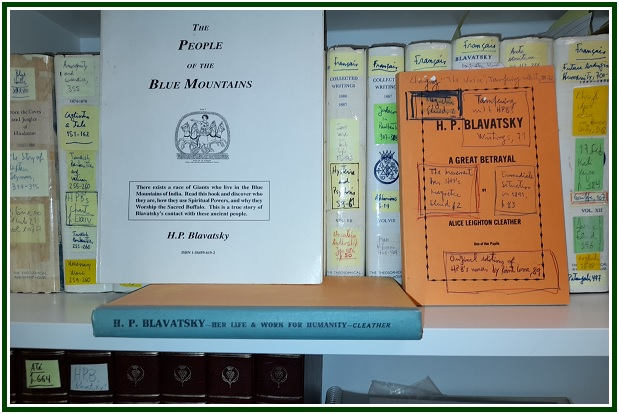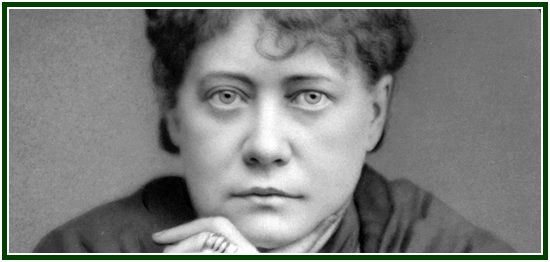
A Tremendous Inspiring
Force, and a Real Spiritual Guide
Joan Sutcliffe

An image from the Library of the Independent Lodge of Theosophists.
The I.L.T. aims at learning from the experience of the H.P.B. Library.
0000000000000000000000000000000000000000000000
A 2021 Editorial Note:
The “HPB Library” was established in 1917
in Canada by inspiration of Mrs. Alice Leighton
Cleather, and its main purpose was the study in the
first place of the teachings of the Masters and HPB.
It preserved an independence from both the followers
of William Judge and the followers of Annie Besant.
The present article is reproduced from “The Canadian
Theosophist”, Toronto, Canada, Sept-Oct 1991, pp. 85-87.
(CCA)
000000000000000000000000000000000000000000000000000
The esoteric line of H.P.B.’s teachings lost a powerful and dedicated worker in Michael Freeman’s passing on July 14, 1991. Since 1969 he was the custodian of the H.P.B. Library, which was established in 1917 by Alice Leighton Cleather as an independent centre, distinct from the Theosophical Society and other organized Theosophical groups. The background tone of the Library was based on Mrs. Cleather’s experience as a personal pupil of H.P.B. since 1887, then a member of her Esoteric Section, and later the Inner Group. After the withdrawal of H.P.B. and the consequential split in the Society, followed by the death of William Q. Judge, she became disillusioned with the new leaders and their personal biases which were being presented as Theosophy. In those days, being before the publication of the Mahatma Letters, there was much confusion and many students were unclear as to what the Masters had really taught. So, having ended her association with all formal Theosophical bodies, she founded the Library as a centre for making available the Ancient Wisdom as taught and approved by H.P.B. and the Adepts.
Michael Freeman first came in contact with the H.P.B. Library in 1932 at a young age, and studied for many years under Mrs. Hildegard Henderson, then the operator of this spiritual centre. Because Mrs. Cleather had received esoteric instructions and philosophy from H.P.B. as a pledged pupil, the attitude of the Library was serious, always emphasizing occult responsibility rather than intellectual satisfactions. The teaching via Mrs. Henderson was rigorous, demanding a lifetime’s allegiance, its study and practice bringing in their wake trials and tribulations. Early on, Michael recognized this as an inevitable reaction to the privilege of stepping, however slightly, within the pale of cosmic forces: and no matter what the outer man must undergo it is the Inner Disciple who can and does come through the test. Undeviatingly, he followed this path right to the end.
While still a young man he made a special study of Damodar, collecting together everything written by him, and all information, known and obscure, pertaining to him. This study was prepared in book form and published by the H.P.B. Library under the title “Concerning Damodar”. At the time this was a new venture and an important task as Damodar was named by H.P.B. as the one successful chela.
Nowadays there is an abundance of gurus, and so-called mystical societies flourish. However, the outlook of the H.P.B. Library is based on the recognition of the uniqueness of the effort made by the Mahatmas through H.P.B. It occurred at a particular point in the sidereal cycle, 2,500 years after Buddha, and 5,000 years after Krishna. It had the great and esoteric purpose, not to be repeated until another special cyclic point, of actually opening up to humanity at large the age old secret path to the Masters. The way to initiation was made available to whomever could attain it through the living practice of universal brotherhood.
It was this spirit of the Library that Michael devoted his whole life to preserving. Occultly the Library takes the perspective that, in spite of the failure of the T.S. to live up to its original high purpose, the path to the Masters is always open to the determined and one-pointed individual. Anyone can become a chela at any time in one’s inner self. It means establishing one’s own inner commitment, setting one’s own standards and tests, and most importantly the constant redirection of the will. The key words are in one’s inner self, for this has nothing to do with the personal self, which must be risen above. This is the hardest task, the work of lifetimes, but the inescapable rule. In this connection Michael stressed the necessity of making the concept of brotherhood a practical reality, for in his inmost essence the neophyte is one with all other beings. Having sprung from the One Life, the Whole is contained within him as he is in the Whole. Where one’s life is motivated by compassion for all souls, the personal desires and passions lose their vitality; conversely when detachment is attained one can become a helper of humanity.
Michael Freeman always refused recognition as a teacher, as “the finger pointing to the moon is not the moon”. Yet to many students he was a tremendous inspiring force and a real spiritual guide. To the earnest seeker there were no lengths of trouble he would not take in giving help and encouragement; and most of all he passed on the teachings by his own practical example. The importance of setting up one’s own inner centre was something he insisted upon, for unless the spiritual fire within is firmly established, when the teacher has gone the pupil will flounder hopelessly by every passing wave of Maya. Therefore, in all Library contacts he always addressed the Inner Man, and his message was based on the injunction: “Thou canst not travel on the Path before thou hast become that Path itself”.
Exoterically, from the historical angle, the Library houses complete collections of original bound volumes of old Theosophical magazines, such as The Theosophist, Lucifer, The Path, and many lesser known publications. It is also a depository for much interesting and informative correspondence between members of differing standpoints during earlier and critical periods in the Movement. As such it has been a valuable source for research students in the past, and Michael was always helpful in assisting and making this material available.
Those who have made a pilgrimage to the H.P.B. Library, whether in search of history or metaphysics, all alike have been struck by the beauty of the surroundings, the peacefulness amidst gardens and fruit trees, the warm family welcome. Yet, through Michael’s care and attitude the library has retained its occult atmosphere, impersonal and pure.
During the last five years of his life, Michael encountered much suffering. It seems to have been the suffering of all great souls taking on an extra load of karma, hopefully to free the eternal Ego for a good start in the next cycle.
To Mrs. Jean Freeman and the family, all Theosophists will send their kind thoughts. Jean, herself a searcher into the philosophy, was a true Theosophical companion, always ready to sacrifice personal feelings for the cause. Every visitor will attest to her firm background support to the Library.
000
The article “Michael Freeman and the H.P.B. Library” was published at the associated websites on 6 September 2021.
With the death of Mr. Freeman in 1991, Ms. Joan Sutcliffe assumed responsibility for the H.P.B. Library and moved it to Toronto, Ontario, Canada.
000
Click to see articles and books by Alice Leighton Cleather.
Examine the article “Studies in the Pre-History of the ILT – From the 1890s to the Decade of 2020”, which is part of “The Aquarian Theosophist”, July 2021 edition.
000
Read more:
* “Annotations on Karma”.
000

Helena Blavatsky (photo) wrote these words: “Deserve, then desire”.
000